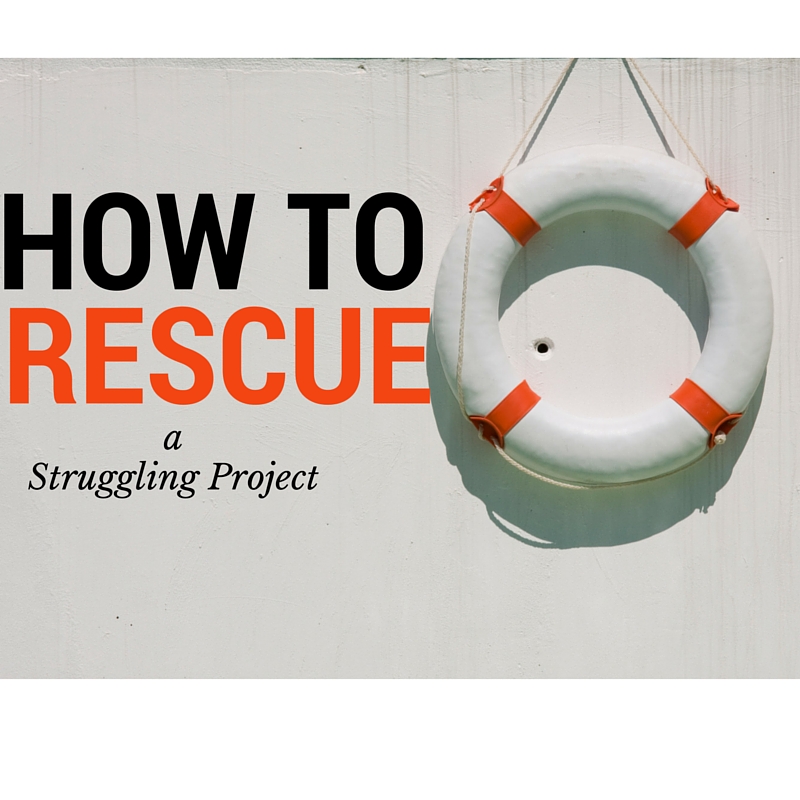Sometimes we get thrown into work situations where things aren’t operating well. Maybe we get assigned to a team that’s low on morale, or we’re faced with an unhappy customer.
When we’re faced with a struggling business project, we can throw up our hands and try not to rock the boat. Instead, a better career move is to pinpoint the real issues, and then determine ways to improve. You’ve probably done something like this–led process improvements–many times during your career.
How could the same principles we use for rescuing a struggling project at work apply to our personal lives?
If you think about it, many activities in our lives are really “projects.” If you want to lose weight, that’s a project. Trying to meet Ms. Right? You have yourself a whopper of a project ahead of you. Nearly anything you set about doing with an end result is a project. Merriam-Webster defines a project as a planned undertaking.
And a project needs a measurable goal. Otherwise, how do you know the project succeeded? Projects also have a defined beginning and an end date.
What projects do you have going on? Are you halfway through writing a book, only to find you’ve stalled? Did you start an exercise or diet regimen, and are not getting results?
We can apply the same ideas we use in the workplace to rescue our own struggling personal projects. Here are a few ideas…
1. Assess the current state – what are your main challenges and issues? If you are dependent on others, is someone not delivering on time? Try to pinpoint what the frustration is and set about tackling that specific issue.
Sometimes what we think is an obstacle might not really be the root cause. You might try a trick of asking yourself “Why?” 5 times. For example, I might think the reason I’m stalled on writing my next book is because I’m lacking time. But after I asked myself again, I realized the truth: I wasn’t allocating time every day to work on my book. Instead, I was spending time on social media when I should have been writing.
2. Is your timeline realistic? Ever started out with a grand plan to write a book in 30 days or lose 20 pounds in 6 weeks? How did that work out? As happens in the real business world, and is true for most people, the schedule falls behind.
We can’t go from 0 to 100 mph, now matter how superhuman we think we are. Break down the work. What are the 8 steps you need to deliver your product? Think of your end goal and break it apart into smaller, actionable steps. Need 20 chapters for your book? How many words per day do you need to write? If each chapter is 2,000 words, you’ll need 40K words for your book. That’s 1,334 words per day to get it done in one month. Can you realistically write that much every day? Perhaps 667 words daily over 2 months is more realistic. And more likely to get you to the finish line without all the stress and anxiety of feeling like you’re behind.
3. Does your project suffer from low energy? When we join a new project team at work, we talk to people. It’s natural to do some detective work especially in situations where there are issues. Often, there’s a personality on the team that’s bringing energy down. Or maybe there’s some other hidden energy suck.
What’s bringing your energy level down? Are you getting enough sleep? Is your commute making you irritable and cranky so that when you get home, you have no energy to work out? Consider those things that may be bringing you down and how you can work around them.
4. Get rid of time wasters. At work, we’ve all attended lousy meetings. Hopefully, you’ve eliminated unnecessary meetings as much as possible. Just as we scrutinize our time spent at work, we must take the same approach in our personal lives. How are you spending your time? Try a free tool such as Rescuetime to learn what you’re really doing online. Are your activities adding value and helping you reach your goal? Can you delegate chores to other family members? I use an on-demand grocery service to save me the 2-3 hours per week that I would have spent shopping.
5. Talk to people. People are what drive results in the workplace. Ever had a mentor? Is there someone whom you can think of who has been in your shoes? Perhaps a friend who lost weight or who trained for and ran a marathon. Reach out and ask them what helped them and what issues they ran into along the way.
6. Got a difficult customer? Could it be you? At work, we can’t always choose whom we do business with. Sometimes we’re faced with a difficult customer or colleague. What do we do? We level with them. We let them know we’re invested in the success of their project. We bring ideas to the table that they can review. We try our best to stay positive.
As you struggle to reach your personal goal, are YOU your own difficult customer? Imagine a consultant or a coach giving advice to you. What would they say? Try to look at your progress objectively.
For example, let’s say you planned to wake up at 5am and work out. But you’ve only been successful once or twice. Isn’t it time to switch up your plans? When an approach is not working, sometimes we’re the last to admit the truth.







Leave A Comment